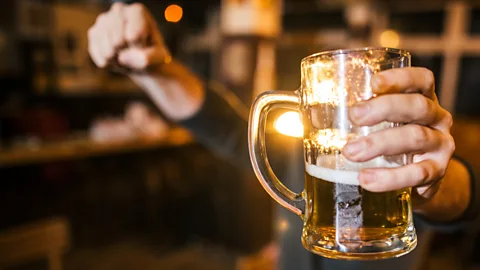What we know about alcohol-induced blackouts
 Getty
GettyThe concept of being blackout drunk has been in the news recently. But what does being ‘blackout’ really mean in terms of brain processing, memory formation, and how someone acts – and how common is it, particularly among young people? Here are some quick facts.
• A blackout occurs when the brain is temporarily unable to record memories. It can be induced by drinking, because alcohol disrupts the activity of the hippocampus, inhibiting its ability to create long-term memories. “It’s like a temporary gap in the tape,” Aaron White of the US’s National Institute on Alcohol Abuse and Alcoholism told BBC Future in an earlier story on blackouts and drinking.
• It isn’t always apparent to others if someone is in the midst of a blackout. In some early studies on the phenomenon, blackout subjects were able to recall events a couple of minutes after they happened and could even perform simple calculations. A half an hour later, however, they’d forgotten the events completely.
• For drinkers, getting to the point of ‘blackout’ is surprisingly common. In a study of more than 1,000 college students, more than two-thirds – 66.4% – reported experiencing at least one blackout. Another analysis of more than 4,600 participants found that 52% of men and 39% of women reported having at least one blackout in their lifetime, while 21% of men and 11% of women reported having had three or more in one year. And a study of 2,000 participants one year out of secondary school found that, of the 68% who admitted having ever had a drink, 20% reported they had experienced a blackout in the previous six months.
• Not everyone blacks out from having the same number of drinks. One study found that the frequency with which people had gotten drunk in general in the last month was a risk factor for whether someone experienced a blackout.
• Blackouts affect some people more than others. Women report them more frequently than men. There also seems to be an inherited component. A large study of twins found that genetic risk alone accounted for more than half of the blackouts experienced. In a different analysis, drinkers who reported that their mothers may have been problem drinkers were more likely to report blackouts than those who did not, but there was a difference here between the sexes. Men who said their mothers had a drinking problem were twice as likely to black out than women who said the same.
• Because the brain is still developing during our teenage years and early 20s, heavy drinking in adolescence, in particular, can lead to changes in the brain.
• Even after controlling for other factors, blacking out is an independent predictor of being in trouble with the police and damaging property. It is a risk factor for other negative consequences of drinking, from missing appointments to getting hurt. It increases the chance of experiencing “unwanted, unsafe, and regretted sexual behaviours”, particularly among women. Women who have been sexually assaulted in the past also are more likely to be re-victimised while blacked out. But that can lead to a catch-22: although someone who is experiencing a blackout is more vulnerable to sexual assault, someone who has blacked out isn’t usually seen as a reliable source about what happened.
Read more about blacking out in our earlier story on why only some people get blackout drunk – and its risks and consequences – on BBC Future.
If you liked this story, sign up for the weekly bbc.com features newsletter, called “If You Only Read 6 Things This Week”. A handpicked selection of stories from BBC Future, Culture, Capital, and Travel, delivered to your inbox every Friday.